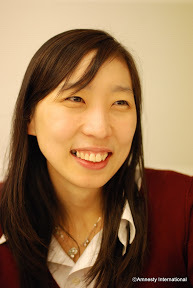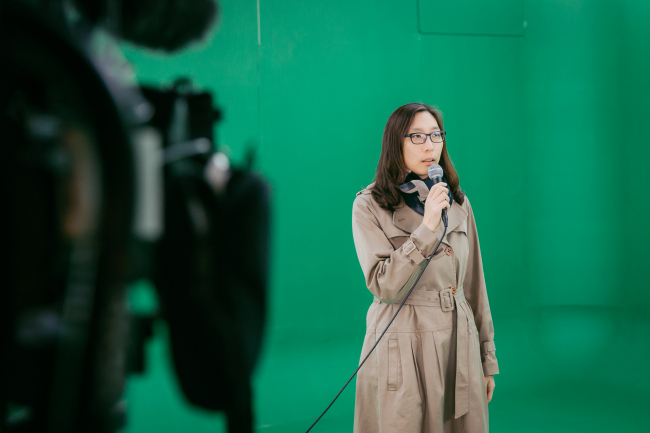[CONTRIBUTION] Freedom of assembly on trial in South Korea
By Ock Hyun-juPublished : July 1, 2016 - 16:24
To bring attention to the shrinking right to freedom of peaceful assembly in South Korea, Amnesty International organized a holographic Ghost Protest in Gwanghwamun Plaza, downtown Seoul, in February this year.
Fortunately, the assembly took place without a hitch.
But consider for a moment what would have happened had a participant suddenly become violent. What if in their frustration they had suddenly struck out, kicking a police vehicle parked nearby?
The police might intervene to prevent an escalation of violence or stop a crime from taking place. But what if the police then decided to arrest Amnesty International for organizing the event in the first place?
While this may sound patently absurd, the reality is that demonstration organizers are routinely being hauled before South Korean courts and being charged for the actions of participants.
The most recent illustration of this is that of labor leader Han Sang-gyun who was arrested in December last year. Han has been charged on eight counts including obstruction of public duty and obstruction of traffic relating to his role as an organizer in a number of demonstrations.
The prosecution has argued that Han should be held personally responsible for property destruction and the actions of others during demonstrations that he helped to organize.
Placing responsibility on organizers for the unlawful actions of participants is incompatible with human rights standards and has a chilling effect on freedom of assembly, deterring others from hosting demonstrations and exercising their basic rights.
The most authoritative voice on the subject, United Nations special rapporteur on the rights to freedom of peaceful assembly and to association, Maina Kiai has repeatedly made this point.
In June he expressed his concerns over Han’s arrest to the U.N. Human Rights Council, having made a personal trip to meet with Han in the Seoul Detention Center earlier in the year.
Seeing Han in the dock dressed in prison garb was a shock to many. This is a man who one is more accustomed to seeing magnified onto giant screens in public squares. But as the South Korean authorities continue to restrict access to these public spaces, the wider symbolism of Han’s arrest is unmistakable.
The targeting of Han and other demonstration organizers is symptomatic of the erosion of basic freedoms that is threatening to become a defining feature of President Park Geun-Hye’s legacy.
The South Korean authorities must enforce the rule of law in accordance with human rights standards, which means ensuring that demonstrators are not investigated or held criminally responsible simply for organizing demonstrations.
Han’s verdict will be announced on July 4. The prosecution is demanding an eight-year sentence. With many watching this case closely, it is clear that this is bigger than just one man. The right to freedom of assembly itself is on trial.
By Catherine Heejin Kim, Amnesty International Director


Catherine Hee-jin Kim is the director of Amnesty International Korea, a position she has held since 2004. She has also worked for Amnesty International’s International Mobilization Program, helping to develop the global movement. -- Ed.
-
Articles by Ock Hyun-ju








![[Graphic News] More Koreans say they plan long-distance trips this year](http://res.heraldm.com/phpwas/restmb_idxmake.php?idx=644&simg=/content/image/2024/04/17/20240417050828_0.gif&u=)
![[KH Explains] Hyundai's full hybrid edge to pay off amid slow transition to pure EVs](http://res.heraldm.com/phpwas/restmb_idxmake.php?idx=644&simg=/content/image/2024/04/18/20240418050645_0.jpg&u=20240419100350)






![[From the Scene] Monks, Buddhists hail return of remains of Buddhas](http://res.heraldm.com/phpwas/restmb_idxmake.php?idx=652&simg=/content/image/2024/04/19/20240419050617_0.jpg&u=20240419175937)

![[KH Explains] Hyundai's full hybrid edge to pay off amid slow transition to pure EVs](http://res.heraldm.com/phpwas/restmb_idxmake.php?idx=652&simg=/content/image/2024/04/18/20240418050645_0.jpg&u=20240419100350)

![[Today’s K-pop] Illit drops debut single remix](http://res.heraldm.com/phpwas/restmb_idxmake.php?idx=642&simg=/content/image/2024/04/19/20240419050612_0.jpg&u=)